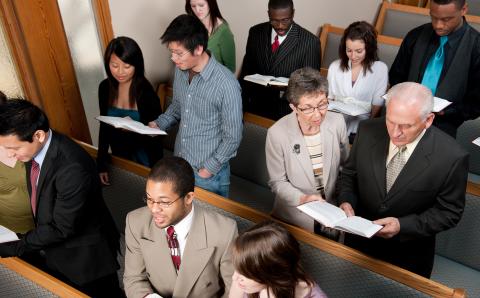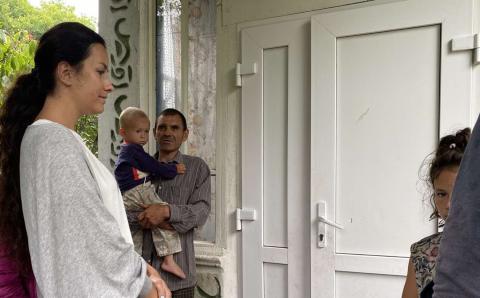What will be the next chapter for Queens Christian Reformed Church? Several years into a long-simmering dispute between the signature Christian Reformed ministry in the Jamaica area of New York City and Classis Hudson, the regional body of churches that includes QCRC, there seems no easy answer to the question. Recently, Christianity Today brought the dispute to the attention of the church world beyond the CRC.
QCRC was founded in 1956 under the leadership of Paul Szto. It was the first Mandarin-speaking church and one of the first Chinese congregations in the CRC. Szto had an influential career in the CRC. Ordained in 1957 as one of the first Chinese pastors in the CRC, he fostered Chinese ministries in Chicago, Los Angeles, and San Francisco, served on denominational boards, was delegated many times to synod (the CRC’s annual general assembly), and became a trusted adviser for Chinese ministries across the denomination. In 1968, QCRC was the first Chinese church to build its own building.
Educated at Westminster (Philadelphia) and Union (New York) seminaries, Szto brought an innovative approach to theology and ministry, including at QCRC. He retired in 1986 but continued in active ministry until the early 2010s. In the later years of his ministry, the QCRC congregation diminished in number, prompting the congregational leadership to invite a Chinese-speaking Presbyterian Church of America congregation, Covenant of Grace, to use the QCRC building for its ministry. Since 2012, CoG has held worship services in the QCRC building. The remaining members of QCRC worship with CoG. Szto died in 2019 at age 95.
The relationship between QCRC and the CRC became increasingly difficult in the last decade of Szto’s life. In 2011, Szto wrote a letter to Classis Hudson informing the classis that QCRC “would leave the CRC,” referencing the CRC’s policy on women in church office.
The letter led to a series of interactions between QCRC, Szto, and Classis Hudson. The classis determined that QCRC no longer had enough members by the rules of Church Order to support a functioning council, and in September 2013 it declared QCRC to be an “emerging” congregation (not officially organized). This decision was contested by QCRC representatives, but in 2019 the classis reaffirmed its decision. QCRC representatives appealed the classis decision to synod. The Council of Delegates (the denominational board of trustees), acting in lieu of synod, denied the appeal in 2021.
As an emerging church, QCRC was placed under the council of Faith Community CRC in Wyckoff, N.J. Classis also appointed an oversight committee to work out the future of QCRC. This began a decade-long negotiation between Classis Hudson and the QCRC representatives. The negotiation throughout has been characterized by the reluctance of the QCRC representatives to participate at all in the process—which they characterize as unbiblical and contrary to the Church Order—and, equally, the determination of Classis Hudson to bring the process to a clear and certain conclusion.
In this process Classis Hudson has been represented by an ad hoc committee, which until recently had three members: Joel Vande Werken, a former Classis Hudson pastor now pastoring in Whitinsville, Mass.; Richard Ostling, longtime religion writer for Time magazine and a member of Ridgewood (N.J.) CRC; and David Dykhouse, a bankruptcy attorney and member of Faith Community CRC in Wyckoff. Ostling recently stepped down from the committee (his term expired in 2020) and has not been replaced.
The question of who should represent QCRC in negotiations with classis has been contentious. The congregation, now only 10-15 members, has been represented by longtime elder David Lowe, who lives in New Jersey, and by two children of Paul Szto, Peter and Mary, professors, respectively, in Omaha, Neb., and Syracuse, N.Y. At a pivotal January 2020 meeting of Classis Hudson, David Lowe was given the right to speak, but Peter and Mary Szto were not; classis ruled them ineligible because they lived too far away and were no longer members of QCRC.
The Classis Hudson ad hoc committee presented a long report on QCRC to the classis in January 2020. The report included seven recommendations. Classis adopted all of them. A central recommendation called for “the active QCRC members in regular attendance to initiate a dialogue with the leadership of Covenant of Grace for the purpose of negotiating a detailed plan to formally unite the two congregations on the existing site.”
Under the recommendations of the report, the new congregation could either affiliate with the PCA or with the CRC. The QCRC property would become the property of the union congregation with classis retaining some rights to the property, including for 25 years the right of first refusal if the property were to be sold, and if the congregation affiliates with the PCA, half the proceeds of the sale. Classis would be required to devote the proceeds of the sale to purposes that befit the legacies of QCRC and Paul Szto. The proposed agreement also allows CRC church plants to make use of the building rent-free for 10 years, provided such use is “reasonable and does not displace the ministry of the united congregation.”
Classis further required that QCRC provide classis with a list of documents related to the ownership and finances of the congregation and any existing agreements with Covenant of Grace. A final agreement for the proposed union was to be submitted to classis by Dec. 15, 2020. If QCRC failed to meet this deadline, the classis asserted its right to take legal action.
That deadline has long since passed, and the proposed union between QCRC and CoG has not taken place. In September 2021, the classis decided to authorize its Classical Interim Committee to take legal action against QCRC, if necessary, to secure the QCRC property and other assets. Thus far no legal action has been taken. The representatives of classis and QCRC reported to The Banner that the two parties continue to negotiate, but neither is willing to share specifics about those negotiations, including how often they have met and what they have talked about.
What’s at issue in this lengthy and convoluted dispute? In the ad hoc committee report to Classis Hudson, the ownership and maintenance of the property looms large. The committee contends that the present arrangements between QCRC and Covenant of Grace are “informal and tenuous,” depending heavily on a single QCRC leader, David Lowe, who does not live in the area. This, the committee alleges, “exposes the valuable QCRC properties to legal risk because the congregation does not have the necessary structures in place to carry out the responsibilities of ownership.” According to the committee, classis finds it necessary “to enforce some kind of accountability and timeline upon the discussions that have consumed the energy of classis” for now over nine years.
David Lowe, principal QCRC representative, sees it differently. Lowe believes the process has been flawed from the beginning. In a Dec. 31, 2021, communication, he said, “We believe Classis Hudson has been a stumbling block to ministry, resistant to open and honest dialogue, and has taken neither a pastoral or covenantal approach to solutions.” In a list of “process queries,” he contends that Hudson has failed to follow church order, excluded QCRC representatives from their deliberations, appointed as council of care a church geographically and culturally distant from QCRC, and threatened to sue in civil courts, an action he believes is contrary to 1 Corinthians 6.
It is apparent that there is little trust between the parties. In September 2021 Christianity Today ran an article on the QCRC dispute. In it, Mary Szto alleged that the actions of the classis are “a form of anti-Asian violence.” Responding to Szto’s allegation, Colin Watson, CRC executive director, in a letter to classical stated clerks, pointed out that roughly half of the ministers in Classis Hudson are Asian.
James Lee, a Korean-American pastor of a majority-white congregation in East Islip, N.Y., and ethnic adviser to Classis Hudson, also praised the classis’ inclusiveness, noting that several New York City Asian congregations have inquired recently about joining the classis. “I love Classis Hudson. I love the colleagues I have met,” he said, seeing not much need for change.
Still, the divisions between QCRC and Classis Hudson run deep, with a long history of misunderstandings, slights, and suspicions. It’s not easy to see how it will come together. And, perhaps because of the looming possibility of litigation, neither side is willing to speak openly about what is likely to happen in the near future. For now, the talks go on.
About the Author
Clayton Libolt was the long time pastor of River Terrace Church in East Lansing, Mich. Since his retirement, he has served in a variety of interim positions. He is presently serving as the interim senior pastor of Sonlight Community CRC in Lynden, Wash.








